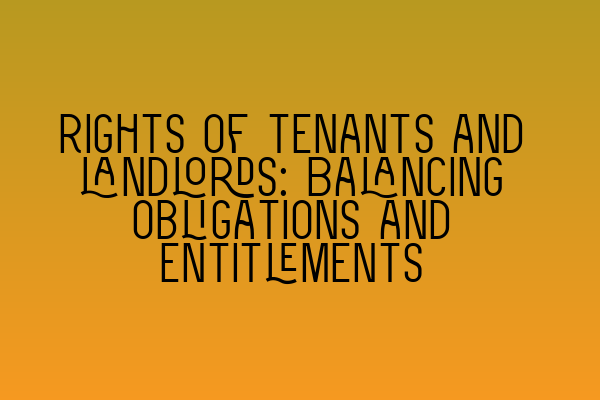Rights of tenants and landlords: Balancing obligations and entitlements
As an experienced solicitor at SQE Property Law & Land Law, I understand the importance of maintaining a fair and balanced relationship between tenants and landlords. Both parties have rights and responsibilities that must be upheld to ensure a harmonious and legally compliant tenancy agreement. In this blog post, we will explore the rights of tenants and landlords and delve into how these rights can be effectively balanced.
1. Right to safe and habitable living conditions
Tenants have the right to live in a safe and habitable environment. This means that landlords are legally obligated to provide adequate living conditions, including functioning plumbing, heating, and electrical systems. Landlords must also ensure that the property meets all health and safety requirements, such as fire safety regulations and proper ventilation.
2. Right to privacy
Tenants have the right to enjoy their privacy within their rented property. Landlords cannot enter the property without proper notice, except in emergency situations. The notice period varies depending on the circumstances and the terms of the tenancy agreement. It is important for both parties to understand and respect each other’s privacy rights to maintain a mutually beneficial landlord-tenant relationship.
3. Right to a fair rental agreement
Both tenants and landlords have the right to agree on fair and reasonable terms regarding rent, security deposits, and other fees. Rental agreements should be clear, concise, and in compliance with relevant legislation. It is essential for tenants to thoroughly read and understand the terms of the agreement before signing. If any disputes arise, seeking legal advice or mediation can help resolve issues effectively.
4. Right to repairs and maintenance
Tenants have the right to request repairs and maintenance when necessary. It is the landlord’s responsibility to address these requests in a timely manner to ensure the property remains in good condition. Landlords should maintain a system for reporting and addressing repair issues promptly. Failure to meet repair obligations could result in legal consequences, such as compensation claims.
5. Right to peaceful enjoyment of the property
Tenants have the right to peacefully enjoy their rented property without interference or harassment from the landlord. This includes respecting the tenant’s right to quiet enjoyment and refraining from any unnecessary disturbances. Similarly, tenants must also observe the terms of the tenancy agreement, such as noise restrictions and not damaging the property.
6. Right to protection against unfair eviction
Landlords cannot unlawfully evict tenants without proper legal procedures. Tenants are entitled to sufficient notice and valid grounds for eviction. Different regions may have different laws and regulations regarding eviction procedures, so it is essential for both parties to be familiar with the specific requirements in their jurisdiction.
7. Right to challenge unfair practices
Tenants have the right to challenge any unfair practices or breaches of their rights by landlords. This can include seeking legal advice, contacting local housing authorities, or filing complaints with relevant regulatory bodies. Landlords must be held accountable for any actions that violate the rights of their tenants.
In conclusion, balancing the rights of tenants and landlords is crucial for a mutually beneficial and legally compliant tenancy agreement. By understanding and respecting each other’s rights and obligations, both parties can establish a harmonious relationship. At SQE Property Law & Land Law, we are committed to helping both tenants and landlords navigate the complexities of property law with professionalism and expertise.
Related Articles:
– SQE 1 Practice Exam Questions
– SQE 1 Practice Mocks FLK1 FLK2
– SQE 2 Preparation Courses
– SQE 1 Preparation Courses
– SRA SQE Exam Dates
